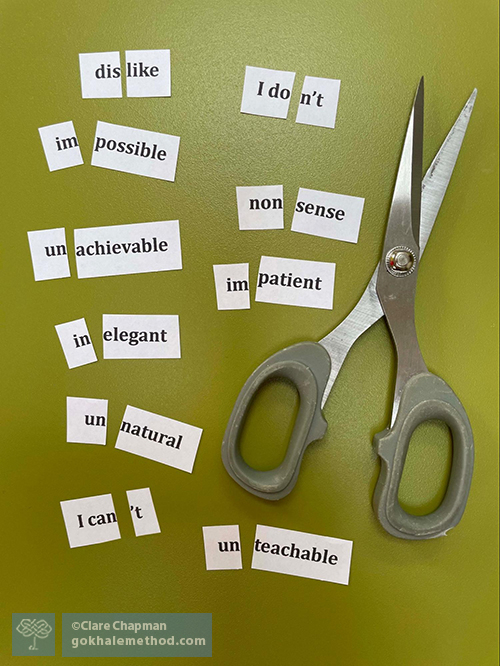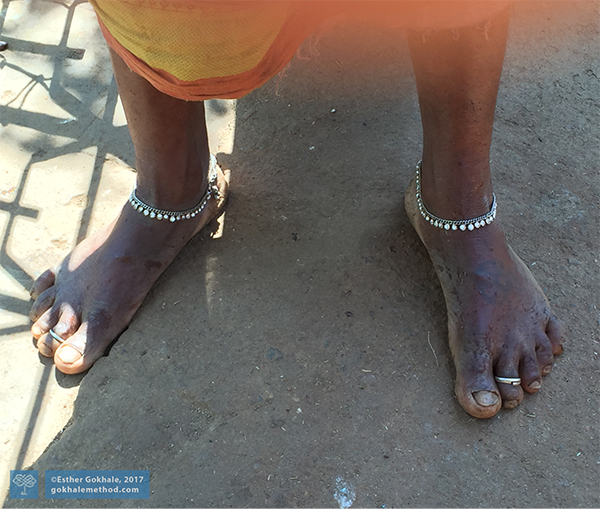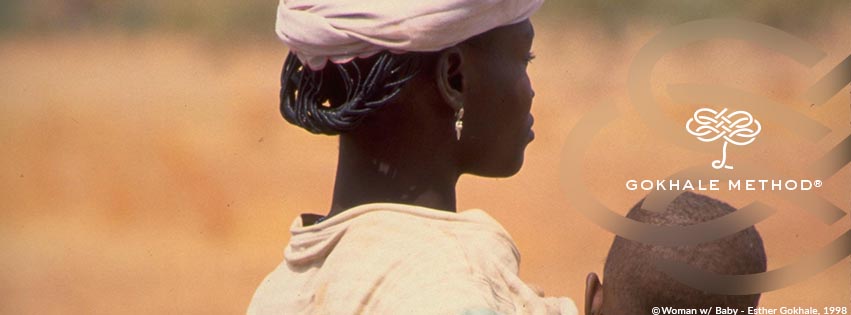We’re a month into the New Year—and that has me thinking about what helps us to keep going and succeed with our New Year's resolutions. Including our posture and exercise goals.
One thing that I have found works well for me, and for my students, is to choose my words carefully.
Choosing words with care
The words we use can be extremely powerful. They can shift your mindset from negative to positive. We may not even realize that we have disadvantaged ourselves with a mental framework of negative words and phrases until we gain a fresh perspective. These frameworks can go back so many years we have mistaken them for a permanent part of ourselves.
Some of our self-talk goes back to our childhood. Our parents of course do their best for us, but parenting in our culture is often an isolated, poorly supported, and arduous journey. Parents’ anxieties, prejudices, and even best intentions are often embedded in negative language and unwittingly passed on to us. Over the years I have seen how many students have internalized their parents' criticism. I encourage students to let this go. It’s a disservice to yourself.

You can cut out the negatives in your vocabulary.
Our peers have also often learned to speak in terms that are unhealthily competitive and even unkind. For example, imitating or commenting on other people’s physicality is an easy way to score a laugh. The intention may be to entertain, but on the receiving end it can be hurtful.
Change your language to change your mindset
Carol Dweck, a professor of Psychology at Stanford University, wrote her seminal book Mindset about the importance of what we believe to be true, especially about ourselves. A person with a fixed mindset will believe that they have a finite level of endowed talents, intellect, and so on. This is self-limiting, and leads to behaviors which seek to protect this self-image—for example, not trying too hard, or shying away from challenges.

Let’s not limit our potential with negative beliefs and a fixed mindset. Pixabay
This is not to say there’s no individual variation in talent; there clearly is. But aptitude is not a fixed entity. For example, many people feel they cannot dance. Maybe someone told them once that they had “two left feet.” One of our teachers in England, Clare Chapman, told me, “I was a non-dancer for 50 years until I worked with the Gokhale Method. I now enjoy healthier posture, love to dance, and join 1-2-3 Move with my camera on.” Potential can be left unused, or it can be nurtured. What helps is a growth mindset, and a positive vocabulary to express it.
Our daily 1-2-3 Move program includes a joyful Dance Party to start each session.
Here are some examples of fixed mindset language that we have heard over the years as teachers:
- I have the family shoulders—people used to call me “coke bottle.”
- I hate my flat feet
- I have no butt
Such statements hold you back from believing you can change. If you have previously said negative things about your posture, your body, or appearance, there is still the opportunity to reframe your observations positively. For example. . .
- Shoulders come in various shapes and sizes, but how they appear is only partly due to inheritance. Odds are that if you learn how to shoulder roll, you will lose the exaggerated sloping that tends to come with rounded posture. Gently opening and resettling your shoulder joints will guide them “back home” to a more posterior, externally rotated, and natural place. You can learn how to shoulder roll here.
- By learning to kidney-bean shape your feet you can realign the bones of your foot arches, and strengthen the muscles which support them. Restoring this natural foot shape is also a great correction and preventative for bunions. You can use any orthotics you may have as a training aid, although many of our students soon find they no longer need them.

Note the bean-shaped contours of this woman’s feet. She has well developed inner and transverse arches, giving her feet convexity rather than a collapsed shape. (Odisha, India, 2017)
- Let go of thinking “I have no butt!” What that usually means is that you haven’t yet developed your glutes due to tucked posture, which disadvantages their action. Most people in our culture tuck their pelvis, which results in underusing the glutes. We teach our students how to get their behinds behind them (without tensing their backs), and to use their glutes to power each step. We call this smooth, elegant action glidewalking.

Buttock muscles that have been underused due to tucking the pelvis retain their potential to be developed in healthy walking and posture.
Changing your posture with love
All these techniques and principles are covered in our in-person Foundations and Pop-up courses, and our online Elements course. Technically effective and efficient as our courses are, our teachings really land best when we bring love into the process. A loving attitude enables new possibilities and holds us safely on course. It is the best way to parent, to teach, and to succeed in changing what we do. It is not by accident that the name of our publishing house for 8 Steps to a Pain-Free Back is Pendo, the Swahili word for love.
Changing your posture with positivity
The uplifting words, music, and dance of Bing Crosby and the Andrews Sisters summarize it all. . . Enjoy!
The inspiring song Ac-Cent-Tchu-Ate the Positive alongside video footage.
To find out how the Gokhale Method can help you become pain free, schedule an Initial Consultation, online or in person, with a Gokhale Method teacher.
To learn more about the Gokhale Method, sign up for one of our upcoming FREE Online Workshops...



Comments
To play banana game, you need
To play banana game, you need to know the word "clicker." To access the fruit, you must click on the banana. No brainer! A larger quantity of bananas allows you to purchase more items from the banana shop. Additional bananas will be yours with this.